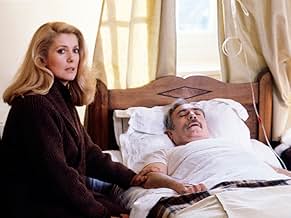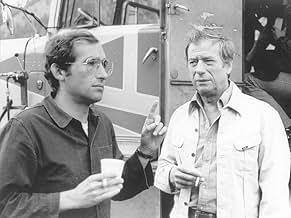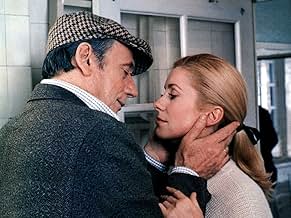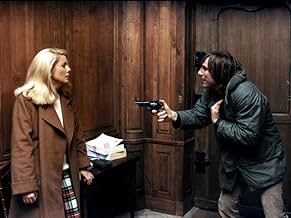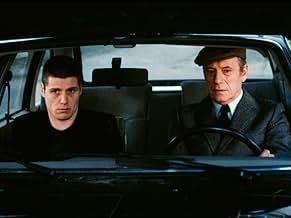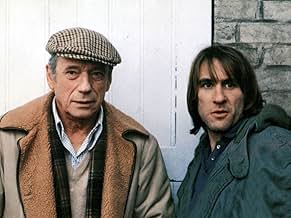IMDb RATING
6.9/10
2.2K
YOUR RATING
The powerful story of a reformed underworld kingpin whose stable lifestyle is turned upside-down when a desperate, escaped killer hides out at his rural estate.The powerful story of a reformed underworld kingpin whose stable lifestyle is turned upside-down when a desperate, escaped killer hides out at his rural estate.The powerful story of a reformed underworld kingpin whose stable lifestyle is turned upside-down when a desperate, escaped killer hides out at his rural estate.
- Director
- Writers
- Stars
- Director
- Writers
- All cast & crew
- Production, box office & more at IMDbPro
Featured reviews
With Melville's death, Tavernier and Corneau became the masters of French film noir, but the latter has the dreamlike mood that the genre really needs to be effective. Le choix des armes has many effective scenes (usually involving either Depardieu or Lanvin) but sometimes leaves us cold. There is a little too much exposition in the storytelling--why show us Montand and his buddy smashing up the gang lord's opulent house when there is no dramatic effect to be gained? Or the elaborate four-way car pursuit (did the budget allow for all those stunt-drivers, so Corneau thought Why not?).
The acting is mostly exceptional. The young Gérard Lanvin gives us a very frustrated young detective, Michel Galabru is his burnt-out superior, Richard Anconina plays a man trying to settle down to happy domesticity and failing, and Depardieu is simply great as Mickey le dingue, crazy and moving at the same time. The woman who plays Dany's wife with burning resentment takes over every scene she's in.
The acting is mostly exceptional. The young Gérard Lanvin gives us a very frustrated young detective, Michel Galabru is his burnt-out superior, Richard Anconina plays a man trying to settle down to happy domesticity and failing, and Depardieu is simply great as Mickey le dingue, crazy and moving at the same time. The woman who plays Dany's wife with burning resentment takes over every scene she's in.
Alain Corneau began as assistant to Costa-Gavras so it is only fitting that as a fully-fledged director he should work with Yves Montand. This fine actor had previously starred in 'Le Cercle Rouge' for Jean-Pierre Melville and of the three policier/polar noirs that Corneau and Montand were to make this last one is the nearest to the Melvillian style, in terms of pacing, atmosphere, its depiction of the criminal 'code' and the wafer thin distinction between the gangsters and the guardians of law and order. This is very much a man's world and a pretty cold and brutal one it is at that.
Montand is Noel, a former underworld figure who has used his ill-gotten gains to finance an extremely comfortable lifestyle as a breeder of thoroughbreds but is obliged by an unexpected train of events to revert to the law of the jungle. On the other side of the coin is the deranged psychopath and prison escapee Mickey of Gérard Depardieu who is humanised only by his love for his child which mirrors Noel's love for Catherine Deneuve as Nicole, his wife. Although their backgrounds and social milieus could not be more strikingly different, both men have more in common than they realise and ultimately(SPOILER COMING) the orphaned child becomes the indissoluble link between them. A further contrast is offered between the old school police chief of Michel Calabru and the intense, trigger-happy, fanatical young inspector of Gérard Lanvin.
This is a well constructed piece with a measured pace that allows the characters to develop and with an utterly riveting second half. It is beautifully shot by Pierre William Glenn, tautly scripted by former critic Michel Grisolia and atmospherically scored by Philippe Sarde.
Nicole is assuredly not the most demanding role that Catherine Deneuve has been called upon to play but the simpatico between her and the magnificent Montand is palpable and helps the film to work. They had earlier worked together on the rom-com 'Le Sauvage'. Likewise there could not be a greater contrast between this and her recent collaboration with Depardieu, 'Le Dernier Metro'. He is larger than life here but always 'true' which is a difficult balance to strike and as usual brings his air of unpredictability. Many have lamented that with maturity he has rather 'let himself go' but when Montand, who worked with him three times, referred to him as 'THE actor of his generation', he wasn't far wrong.
Montand is Noel, a former underworld figure who has used his ill-gotten gains to finance an extremely comfortable lifestyle as a breeder of thoroughbreds but is obliged by an unexpected train of events to revert to the law of the jungle. On the other side of the coin is the deranged psychopath and prison escapee Mickey of Gérard Depardieu who is humanised only by his love for his child which mirrors Noel's love for Catherine Deneuve as Nicole, his wife. Although their backgrounds and social milieus could not be more strikingly different, both men have more in common than they realise and ultimately(SPOILER COMING) the orphaned child becomes the indissoluble link between them. A further contrast is offered between the old school police chief of Michel Calabru and the intense, trigger-happy, fanatical young inspector of Gérard Lanvin.
This is a well constructed piece with a measured pace that allows the characters to develop and with an utterly riveting second half. It is beautifully shot by Pierre William Glenn, tautly scripted by former critic Michel Grisolia and atmospherically scored by Philippe Sarde.
Nicole is assuredly not the most demanding role that Catherine Deneuve has been called upon to play but the simpatico between her and the magnificent Montand is palpable and helps the film to work. They had earlier worked together on the rom-com 'Le Sauvage'. Likewise there could not be a greater contrast between this and her recent collaboration with Depardieu, 'Le Dernier Metro'. He is larger than life here but always 'true' which is a difficult balance to strike and as usual brings his air of unpredictability. Many have lamented that with maturity he has rather 'let himself go' but when Montand, who worked with him three times, referred to him as 'THE actor of his generation', he wasn't far wrong.
2 prison inmates, Mickey (Gérard Depardieu) and Serge escape from jail. After a trap set by other gangsters that leaves Serge badly injured, the two baddies take refuge to Noël Durieux (Yves Montand), a former gangster who leads a bourgeois life by running a stud farm. After Serge dies from his injuries, Noël has the visit of two cops Sarlat (Gérard Lanvin) and Bonnardot (Michel Galabru) who question him about Mickey and Serge and Noël affirms that he doesn't know anything about them. And things take a darker turn for because he believes Noël betrayed him, Mickey gives him a hard time. Noël has no other choice than to eliminate him.
As the heir of Jean-Pierre Melville and Claude Sautet, Alain Corneau brought to French cinema a crop of very well controlled thrillers in their writing and shooting. "Le Choix Des Armes" is part of this league and a valuable illustration of Corneau's stylish approach of French detective film. Adopting a rather sparse directing and a tight, parallel editing, the filmmaker takes pleasure in introducing the main characters and as the film progresses to deepen their personality. Like the greatest filmmakers, Corneau has his style and his set of themes. Communication is a recurrent theme in his filmography, especially the difficulties and absence of it. We learn that the cute little girl is Mickey's daughter and he had it just before he was jailed. The two cops work with different methods which doesn't make their relationships easy. Mickey and Durieux are caught in a vicious spiral that is the result of a happy misunderstanding: because Mickey thinks that Durieux gave him to the police, Durieux has to come back to his former gangster life to get rid of his protégé. As they obey to their respective emotions, the two men and especially Mickey get embroiled in a ruthless system that dwarfs them and prevents any reconciliation between them. A permanent feature (the infernal system) that affects the main characters in Corneau's previous films like in "Police Python 357" (1976) starring Yves Montand.
This somber story is painstakingly built at all levels from the organization of the scenario to the creation of the sequences. Sometimes, one shot or a few ones are sufficient to Corneau to present us the persona of a character in the film like Dany (a young Richard Anconina)'s dumb wife or the duo of cops between ambitious Sarlat and seasoned, disillusioned Bonnardot. The cast lives up to the demands of the story with Depardieu much better than Montand as impulsive, immature Mickey. Horses in Durieux's domain are an evident symbol. One could also hail scenery discerningly chosen that cement the characters' social position, either it is Noël Durieux's lascivious mansion in the country or Dany's shabby flat in popular suburbs. At that time in 1980-1, rare were the directors who dare to shoot in those high-risk outskirts.
This is excellent stuff and it's well known: it's better not to get bogged down in rut. Otherwise, you'll have nothing to say anymore. Thus, Corneau proved his ability at weaving prime thrillers. His next film, "Fort Saganne" (1984) will go in another cinematographic direction: the epic film.
As the heir of Jean-Pierre Melville and Claude Sautet, Alain Corneau brought to French cinema a crop of very well controlled thrillers in their writing and shooting. "Le Choix Des Armes" is part of this league and a valuable illustration of Corneau's stylish approach of French detective film. Adopting a rather sparse directing and a tight, parallel editing, the filmmaker takes pleasure in introducing the main characters and as the film progresses to deepen their personality. Like the greatest filmmakers, Corneau has his style and his set of themes. Communication is a recurrent theme in his filmography, especially the difficulties and absence of it. We learn that the cute little girl is Mickey's daughter and he had it just before he was jailed. The two cops work with different methods which doesn't make their relationships easy. Mickey and Durieux are caught in a vicious spiral that is the result of a happy misunderstanding: because Mickey thinks that Durieux gave him to the police, Durieux has to come back to his former gangster life to get rid of his protégé. As they obey to their respective emotions, the two men and especially Mickey get embroiled in a ruthless system that dwarfs them and prevents any reconciliation between them. A permanent feature (the infernal system) that affects the main characters in Corneau's previous films like in "Police Python 357" (1976) starring Yves Montand.
This somber story is painstakingly built at all levels from the organization of the scenario to the creation of the sequences. Sometimes, one shot or a few ones are sufficient to Corneau to present us the persona of a character in the film like Dany (a young Richard Anconina)'s dumb wife or the duo of cops between ambitious Sarlat and seasoned, disillusioned Bonnardot. The cast lives up to the demands of the story with Depardieu much better than Montand as impulsive, immature Mickey. Horses in Durieux's domain are an evident symbol. One could also hail scenery discerningly chosen that cement the characters' social position, either it is Noël Durieux's lascivious mansion in the country or Dany's shabby flat in popular suburbs. At that time in 1980-1, rare were the directors who dare to shoot in those high-risk outskirts.
This is excellent stuff and it's well known: it's better not to get bogged down in rut. Otherwise, you'll have nothing to say anymore. Thus, Corneau proved his ability at weaving prime thrillers. His next film, "Fort Saganne" (1984) will go in another cinematographic direction: the epic film.
On the basis of a very traditional diagram, almost austere in its banality, Michel Grisolia, the scenario writer, gave his realizer a springboard from which this last built a true psychological drama, rich of subtle nuances and learnedly worked drafts. The police aspect interests less Corneau than the painting of the underworld, than the denunciation of the police methods or than the purulent proletarian company of today. The setting in scene is fantastic and remarkable is interpretation (Depardieu!), let us announce however a light Manicheism and certain doubtful psychological analyses.
Alain Corneau was considered as a director who could replace Jean-Pierre Melville's, I mean the new master of the crime film made in France. First there was POLICE PYTHON 357, LA MENACE, then SERIE NOIRE, and just after LE CHOIX DES ARMES. Corneau did not direct only crime dramas, but those ones were his best work, with also the DEUXIEME SOUFFLE remake (2007), three years before his death. Here, you have a perfect cast: Yves Montand, Gerard Depardieu, Gerard Lanvin, Catherine Deneuve.... The story is not that usual, rather unpredictable and I particularly like Gerad Lanvin's ambivalent character, as a trigger happy brutal, ambitious, ruthless young cop.
Did you know
- TriviaThe German dubbed 35mm Dolby Stereo prints did have a sound error: parts within each reel were side-reversed, i.e. what was intended to be heard from the left front speaker was actually heard from the right front speaker.
- ConnectionsReferenced in Girare Le choix des armes (2007)
- How long is Choice of Arms?Powered by Alexa
Details
- Release date
- Country of origin
- Languages
- Also known as
- Choice of Arms
- Filming locations
- La Courneuve, Seine-Saint-Denis, France(apartment complex)
- Production companies
- See more company credits at IMDbPro
Contribute to this page
Suggest an edit or add missing content

